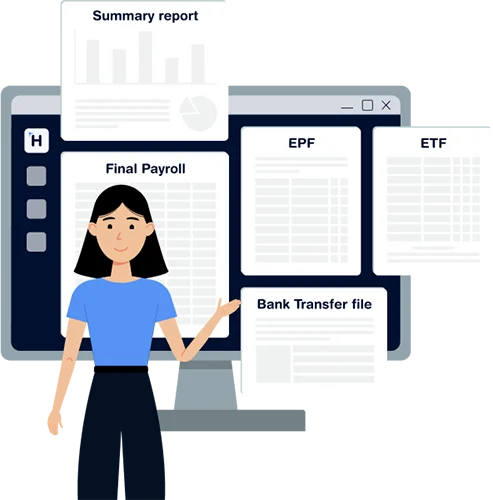Based on our previous articles, you should know that the basic salary is essential for a salary slip. In this article, we will be exploring basic salary in more depth to provide you with a comprehensive understanding of your staff payroll.
What does a basic salary mean?
A basic salary is the initial fixed amount that an employee is expected to earn before benefits, compensation or bonuses are added. Therefore, an employee’s bonuses, allowances, overtime and deductions are not a part of the basic salary. They are the final net salary that an employee receives at the end of the payday.
Now that we have explored the essential background of a basic salary, we should next consider what makes a basic salary different from a minimum wage.
How does basic salary differ from minimum wage?
According to Croner, although the terms ‘salary’ and ‘wage’ are used interchangeably, they have different meanings. A basic salary is a fixed initial payment agreed by the employee and employer upon the employment contract. On the other hand, a minimum wage happens to be the total net salary that depends on an employee’s performance and the number of hours worked at the company.
In Sri Lanka, the minimum wage for your staff in any private sector industry was given legal effect under the National Minimum Wage of Workers Act No.03 of 2016. Following this Act, employers were required to pay their workers a minimum monthly wage of Rs. 10,000 or a minimum daily wage of Rs. 400. However, the National Minimum Wage of Workers (Amendment) Act No. 16 of 2021 amended the old Act. As a result, from 16th August 2021, the minimum wage in Sri Lanka for private-sector employees increased to Rs. 12,500, and the daily minimum wage was increased to Rs. 500.
Nevertheless, a company does not have to stick with the minimum wage of Rs. 12,500 to an employee as long as they don’t pay a minimum amount below the prescribed amount approved by law. The minimum wages are thus decided by specific sector tripartite wage boards where the minimum wage is determined based on an hourly, daily, weekly or monthly basis by the Wage Board under the power of the Wage Boards Ordinance. There are no specific criteria to determine the wage rate as it will be determined based on the cost of living index for employees in a particular industry.
What happens if an employer fails to pay the minimum wage rate?
If an employer fails to comply with the minimum wage determined by the Wages Board Ordinance, the employer will be liable to pay a fine of:
- No less than Rs. 100 and not more than Rs. 250 in terms of a first offence.
- No less than Rs. 250 and not more than Rs. 500 in terms of a second offence.
- No less than Rs. 500 and not more than Rs. 1000 in terms of a third offence and future offences.
Furthermore, the employer will be liable for a fine not exceeding Rs. 50 per day for which the employer continues the offence after being convicted. In terms of the third and future offence, an employer will be imprisoned but not exceeding six months.
Therefore, paying the minimum wage rate to your employee is vital to avoid potential penalties and fines.
What is a basic salary in payroll?
Basic salary plays a vital role in your staff payroll. As mentioned above, it’s the initial fixed payment that an employee receives before any additions or deductions are added to the employee’s salary.
Employees receive the same fractional amount of their annual basic salary each payday. The annual basic salary is divided by the number of paydays in a year to determine this fractional amount. For example, assume that Kamal Motors pays their employees twice a month. This means there will be 24 paydays a year; thus, the employee will receive one twenty fourth of their annual basic salary every payday.
However, it’s important to note that one’s basic salary can change. Most businesses have a minimum and maximum salary range. This depends on the market rate for the particular job and the experience and skills that the specific employee possesses. When an employee gains more knowledge and improves his skills in his particular job, the company may provide increments to the basic salary. However, companies may reduce one’s basic salary considering the economic situation, but this is usually rare.
Gross salary vs basic salary
While basic salary is the initial fixed amount which an employee should receive as per the contract between the employer and employee, the gross salary includes the basic salary plus any other additions such as overtime, bonuses, allowances, and compensation before any tax deductions are made to the gross salary.
Therefore, gross salary = basic salary + additions (bonus+overtime+allowances+compensation)
However, it’s important to remember that having additions to one’s gross salary depends on company policy.
Gross salary vs net salary
In understanding the importance of calculating payroll, the differences between gross and net salaries are also necessary. Those differences include:
Gross salary is the amount individuals earn after the allowances, and basic salary is added but before any deductions are made. On the other hand, the net salary is the total amount that employees take home after tax deductions such as EPF, ETF or if any additional tax deductions have been made.
Gross salary is the maximum salary received by an employee (basic salary + additions = gross salary). In contrast, the net salary is lower than the gross salary once all the deductions have been made (gross salary – deductions = net salary).
It’s important to note that deductions don’t necessarily mean taxes such as EPF and ETF. It also includes insurance payments, loans, APIT Tax, salary advance, no payday deductions etc.
Now that we have explored the various components of staff payroll by comparing them with each other, we will next dive into the salaries earned by a few professionals in Sri Lanka and other countries.
Salaries earned by few professionals in Sri Lanka and other countries in 2022
Although this article was based on giving you knowledge about the basic salary in Sri Lanka for your staff payroll, it’s yet essential that you gain a certain kind of understanding of the average salaries earned by employees in different professions in 2022. According to a globally recognised salary comparison website called Emolument, the average annual salary earned through different professions in Sri Lanka and other countries are listed below:
Average annual salaries earned by professionals in Sri Lanka
- Engineering – USD 41,000
- Consulting, Accounting and Professional services – USD 22,000
- IT and Software Development – USD 20,000
Average annual salaries earned by professionals in Australia
- Executive Management & Change – USD 122,000
- Legal Department – USD 95,000
- Finance Control & Strategy – USD 88,000
- Programme & Project Management – USD 81,000
- Energy, Chemicals & Environmental – USD 78,000
Average annual salaries earned by profession in India
- Agriculture & Forestry – USD 39,000
- Transportation & Logistics – USD 37,000
- Executive Management & Change – USD 35,000
- Healthcare & Alternative Medicine – USD 33,000
- Retail, Trade & Craft – USD 26,000
Average annual salaries earned by professionals in New Zealand
- Financial Services – USD 119,000
- IT & Software Development – USD 69,000
- Compliance, AML, KYC & Monitoring – USD 65,000
- Executive Management & Change – USD 58,000
- Finance Control & Strategy – USD 57,000
Therefore, based on the above analysis, we hope you have gained a comprehensive understanding on the basic salary and the other components discussed for your staff payroll.
Resources
https://www.bamboohr.com/hr-glossary/basic-salary-meaning/
https://croner.co.uk/resources/pay-benefits/difference-between-wages-and-salary/
https://www.desaram.com/BlogArticles/minimum-wages-increased.php
https://salary.lk/labour-law/work-and-wages
https://www.bankbazaar.com/tax/gross-salary.html
https://www.godigit.com/finance/salary/difference-between-gross-and-net-salary
https://www.emolument.com/salary-reports/jobs

